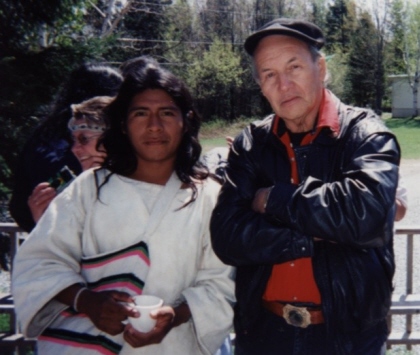 |

 |
 |

 |

August 8, 2002 Halifax Herald Labrador: great role model
ON JULY 28, Pat and I journeyed to West Caledonia, Queens County, to attend the traditional Mi'kmaq burial of a good friend, Chief Charles Wilfred Labrador, who had passed away suddenly, two weeks after turning 70, on July 25. As I watched his birch-bark shrouded remains being lowered into Mother Earth, in the company of his family and several hundred of his friends, many thoughts went through my mind. Foremost among them was that we were bidding goodbye to what's becoming a rarity in this age of greed for self-enrichment: an exceptionally decent, generous man.
Charlie, a devoted husband, father, grandfather and friend, was - among many other things, including an elder who taught the traditional way - the father of the Acadia Band of Mi'kmaqs. This designation came about because, in the early 1960s, he had grown tired of the fact that his band, whose members had been left on a general list after Nova Scotia's other Mi'kmaq bands were recognized under the Indian Act in 1958, had no representation.
The task Charlie undertook to achieve Indian Act recognition for his band, especially the lobbying of Indian Affairs, was not easy because it required him to do things not in keeping with his nature. Being an unassuming man, he didn't relish being assertive, in the limelight, or the intrigues of politics.
The task also created financial hardship for his family. Besides the time he had to take away from the forest work he loved, and resultant loss of income, all travel expenses connected with realizing recognition had to come out of his already strained income. However, he and his wife and three children bore the burden without complaint. This may come as a surprise to many Acadia Band members, especially the younger generations, but much of what they have today is the result of the early sacrifices of Charlie and family.
Financial matters didn't ease up for the family after Acadia Band, comprising Gold River, Wildcat, Medway, Ponhook Lake and Yarmouth reserves, was accorded recognition in 1967. Charlie, now chief, still had to dig deep into his limited resources to keep the band going.
I first met Charlie in 1971. He had come to Indian Affairs' Halifax district office to discuss with me the band's capital budget; I was then the department's district construction clerk. However, it wasn't until 1973, as newly designated local government adviser for Acadia Band Council, that I really got to know him well and began to appreciate his good nature, generosity, honesty and hospitality.
I'll never forget my first visit to his home on Wildcat Reserve - which doubled as band office - and the reception he and his wife Juanita gave me. The conversation and food were great. It was also the day I became fully aware of the department's "generosity" towards small bands.
In Acadia's case, the administration fund allotted by Indian Affairs was so "generous" that the chief could only afford to make three long-distance phone calls per month to Yarmouth Reserve. If problems arose at Yarmouth or at Wildcat, he often had to dig into his own very limited resources to help people out. Charlie kept a souvenir from those days: the "office equipment" Indian Affairs had given him in 1969, a stapler.
Because he was a true Mi'kmaq, being generous and compassionate wasn't out of character for Charlie. He lived by the time-honoured principles that our pre-Columbian ancestors had lived by. Examples:
Honour: You didn't need a written contract with him; his word was his bond. Not to live up to it was unthinkable to him.
Greed and corruption: They weren't in his nature. In fact, the knowledge that so many of our people have embraced this imported-from-Europe sin troubled him greatly. Mi'kmaq tradition requires that all members of the extended family share equally; he firmly believed that enriching oneself at the expense of the community is offensive to the roots of the culture.
Gossip: He was a true believer in this dictum: Don't believe anything nasty about another person, especially a friend, that you hear until you verify it personally. All people should take such advice to heart. Believing the worst of anyone without that person having a chance to defend himself is not the Mi'kmaq way, and should not be modern society's way either.
Charlie wasn't rich in worldly goods; however, he was immensely rich in things that really count: He had impeccable integrity and self-respect; a devoted, loving family; a legion of loyal friends and admirers; and he was gifted with all the great traits that the ancient Mi'kmaq held dear. The honourable way he lived his life is a role-model standard that all humans should aspire to emulate.
Although Charlie is now happily enjoying the company of our ancestors in the Land of Souls, the generosity of his gifts and the memories of our pleasant encounters with him shall be with us always. I join with his family and legion of friends in this prayer: May the Great Spirit assure him contentment and tranquillity for eternity!
Daniel N. Paul